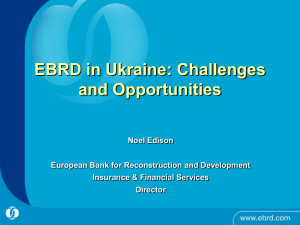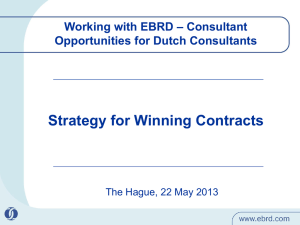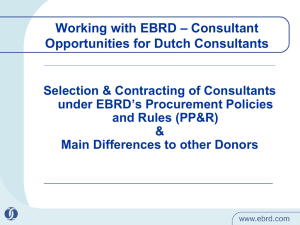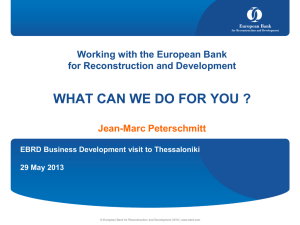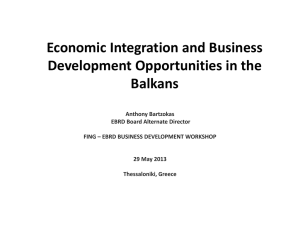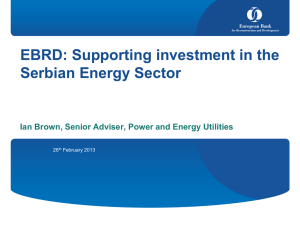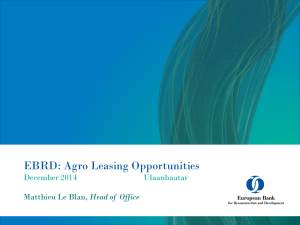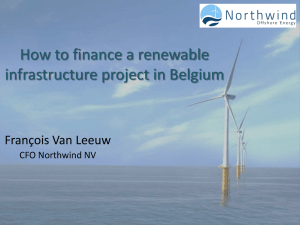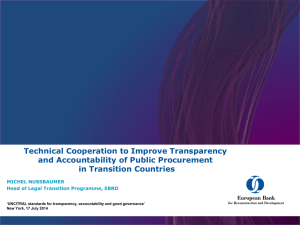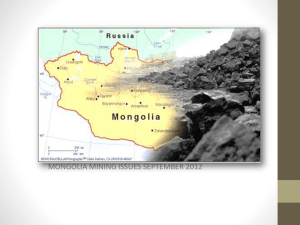EBRD in BiH
advertisement
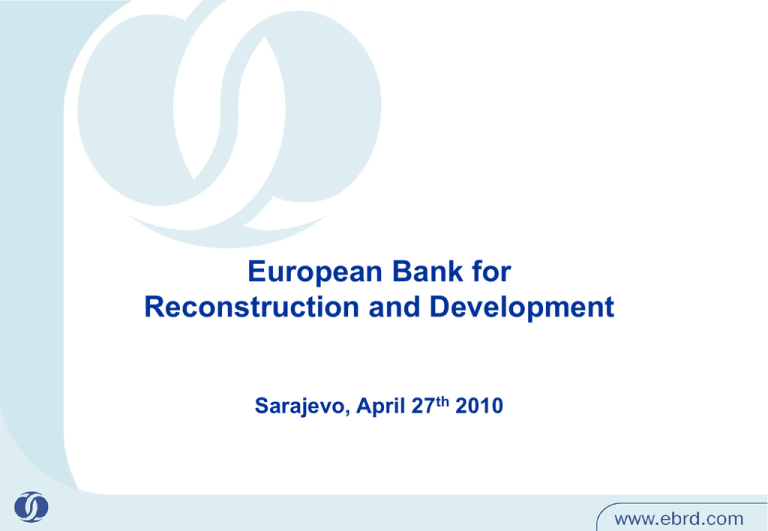
European Bank for Reconstruction and Development Sarajevo, April 27th 2010 Structure of Presentation 1. Introduction to EBRD 2. EBRD in Bosnia and Herzegovina 3. Manufacturing and Services 4. Manufacturing and Services in Bosnia and Herzegovina– case studies 5. Agribusiness 6. Agribusiness in Bosnia and Herzegovina – case studies 6. Financing with EBRD – financing instruments and available programmes 7. EBRD contacts 1. Introduction to EBRD What is the EBRD? International financial institution owned by 63 countries and two inter-governmental institutions. Operates through the Head Office in London and Resident Offices in 30 countries of operation. Works in both the public and private sectors. Financing is provided directly or through financial intermediaries. EBRD is a matrix organization COUNTRY BUSINESS GROUPS 1. Central and Southeastern Europe 2. Russia 3. Turkey, Eastern Europe and Central Asia SECTOR BUSINESS GROUPS 1. Energy 2. Infrastructure 3. Financial Institutions 4. Industry, Commerce and Agribusiness (Manufacturing and Services included) What are the EBRD’s objectives? Support economic growth in its countries of operation. Promote entrepreneurship, competition and privatisation. Promote adoption of strong corporate governance, including environmental sensitivity. Promote foreign direct investment and mobilize domestic capital. Provide technical assistance. EBRD’s cumulative investments amount to more than EUR 47.7 billion in 2009 Cumulative commitments (billions €) 44 40 36 32 28 24 20 16 12 8 4 0 '00 '01 '02 '03 '04 '05 '06 '07 '08 '09 Unaudited as at 30 September 2009 The EBRD is the largest single investor in the region and mobilizes significant foreign direct investment beyond its own financing. As of end 2009, the Bank had cumulative commitments of € 47.7 billion. One of the largest Investors in the region – up to February 2010 € 6.2 billion committed in the Infrastructure, Financial and Private Corporate sectors. 2. EBRD in BiH BiH Strategy Enterprise Sector: support large enterprise privatizations, support medium-sized local and foreign private companies, reach SMEs through the Local Enterprise Facility. Infrastructure: Assisting the country in upgrading its core road network, support the railway and aviation sector, implement projects in the municipal infrastructure sector within each entity, assist the sector commercialisation. Financial Sector: Continue with the support to MSMEs through the local banking sector and non-bank microfinance institutions (NBMFIs), support the development of the remaining locally owned banks and facilitate the entry of new investors in the sector. EBRD in BiH • To date, EBRD signed 78 projects with cumulative business volume of more than EUR 1.1 billion • From February 2007 to February 2010 the EBRD signed 35 projects amounting to EUR 624 million and mobilized additional investments of more than EUR 600 million. Bosnia and Herzegovina: EBRD financing 1996-2009 State Private Total 300 250 EUR million 200 150 100 50 0 1996 1997 1998 1999 2000 2001 2002 2003 2004 2005 2006 2007 2008 2009 Bosnia and Herzegovina: EBRD portfolio by sector MEI Agribusiness 1% 5% FI and MCO 22% General Industry 4% Power & Energy 12% Transport 54% Telecoms 1% 3. Manufacturing and Services Manufacturing and Services New business Group, previously known as General Industry Group created within the Bank – Industry, Commerce and Agribusiness Response to the crisis and growing demand to support the sectors in the EBRD region New unit within ICA Group – Manufacturing & Services Manufacturing and Services New structure : Regionalization of bankers to lead and support the M&S business on a regional basis 10 centers of excellence will be established to concentrate on industry expertise: 1. Chemicals and Petrochemicals 2. Capital Goods 3. Consumer Goods 4. Retail 5. Industrial Logistics 6. Pharmaceutical, Medical Equipment and Healthcare 7. Construction & Materials 8. Automotive & Parts 9. Industry Metals 10. Forestry & Paper Manufacturing and Services in BiH SELECTED CORPORATE SECTOR INVESTMENTS: Arcelor Mittal Zenica – senior long-term loan Natron Hayat Maglaj – senior long-term loan Tvornica Opeke Sarajevo – senior long-term loan Selected transactions: Arcelor Mittal Zenica Signed in 2005 €25 million EBRD loan The acquisition of the BH Steel by Mittal Steel has transferred a major asset of the BiH economy to the private sector. The Bank’s participation in the operation contributed to the success of this privatisation and provided a demonstration effect for other potential investors in BiH. The Bank has committed close to €70m to Mittal Steel in Bosnia and Herzegovina, Kazakhstan, Romania, FYR Macedonia. EBRD is considering additional financing for the environmental protection Selected transactions: Natron Hayat Maglaj Signed in 2006 Kastamonu Entegre (KEAS), the leading Turkish producer of MDF and chipboard, took a majority stake in Natron Hayat D.O.O through privatisation One of the largest FDI in Bosnia and Herzegovina (EUR 65 million) Investment in rehab and environmental and energy efficiency improvements of the mill EBRD provided EUR 11million loan alongside additional financing of EUR 38 million from other international and local commercial banks and ECAs EBRD is considering additional financing in the light of long term partnership 4. Agribusiness in BiH EBRD and Agribusiness Agribusiness • The EBRD has invested over EUR 5 billion in over 340 projects in the Agribusiness sector. • 2009: 59 projects signed with EUR 639 million committed investments. • One of the largest sector teams within the EBRD with 32 bankers in London and Resident Offices accounting for around 40% of the projects in the EBRD’s corporate sector portfolio. • Client network of leading global and regional players. • Indirect support to smaller farmers and food enterprises via SME credit lines. Agribusiness Strategy Downstream Agricultural inputs & production Upstream Primary & secondary processing Packaging & distribution Retail & Food Service • All activities along the food and drink production chain are included and rather focused on increasing demand than supply. • Vertical approach addresses specific risks and features attached to agribusiness ventures. • Downstream investments are mainly in vertical integrated companies with positive spill-over effects to primary agriculture. • As a result, EBRD has a conservative approach towards direct land investments. Important to maximise supply potential and identify bottlenecks along the entire food value chain Investments along the value chain Consumer Distribution Foodservice Seeds Farm Machinery Agricultural Chemicals Bio-tech Distributors/ Services Agricultural Inputs Grains Oilseeds Livestock Dairy Fish Production Edible oil Millers Malters Grain Handling Primary Processing Packaging Production Food Processors Glass Bottles/ Jars PET Bottles Cans Carton Containers Meats/Poultry Baked Goods Confectionery/ Snacks Beverages/Beer/Water Dairy/UHT/Cheeses Frozen Foods Fish Pet Food Food retailers Distributors Caterers Wholesale Markets EBRD and Agribusiness: sector views Potential responses Developing appropriate strategies in dealing with market challenges Retail consolidation is happening but competition is healthy: higher competition in retail will create larger choices for suppliers and consumers. Regional expansion: higher growth opportunities in western Balkan countries including higher brand recognition then in the EU as well as understanding of consumer preferences – establishing early entrance – subsidiaries or JV. Strong processors are the key to a healthy sector; as they provide a sustainable market for agricultural products. A better legal and institutional framework is a must for farmers and processors to get the financing they need – e.g. introduction of warehouse receipts financing. EBRD and Agribusiness: sector views Recognised strategies of sub-sectors Branded food and beverages producers with clear regional expansion strategies - Growing local and international retailers - Projects with: Vitaminka (FYR Macedonia), Tikves (FYR Macedonia), Zdravje Radovo (FYR Macedonia), Vitalia (FYR Macedonia) Marbo (Serbia), Grand (Serbia), Droga Kolinska (Slovenia), Stark (Serbia) Agrokor (Croatia), Dukat (Croatia) Projects with Idea (Serbia), VF Komerc (Bosnia and Herzegovina), Kaufland (regional), Billa (regional) Processors such as edible oil, meat producers - Projects with Victoria (Serbia), Boni (Bulgaria), Bimal (Bosnia and Herzegovina) And most recently – Investments Ukraine) in primary agriculture (Agroinvest, Selected transactions: Konzum d.o.o. Sarajevo Signed in 2009 Konzum d.o.o. Sarajevo,fully owned by Konzum d.d. Croatia which is a subsidiary of Agrokor, the leading producer and distributor of food and beverage products and one of the leading retailers in the South Eastern Europe. EBRD provided EUR 25 million loan alongside additional financing of EUR 25 million from other participating banks to support the expansion of the company’s retail network in BiH and the financial restructuring. Selected transactions: BIMAL Brcko BIMAL is the only edible oil producer in BiH with sales of EUR 50 million in 2009. 2008: the Bank provided EUR 6 million financing for agri commodity financing. 2009: EUR 4m for permanent working capital financing. Strong presence in the region, including exports to the EU. 5. Financing with EBRD – financial instruments and available programmes The EBRD offers a variety of different financing instruments Loans Equity Senior, subordinated, convertible Common / preferred shares Long term Mezzanine financing Working capital Fixed / floating interest rates Exclusively minority participations (up to 35%) Major (USD, EUR) and local currencies (e.g. Romania, Russia, Poland) Political risk guarantees “Portage Equity“ Syndication In-house syndication unit Lender of record EBRD‘s Preferred creditor status attracts other financiers EBRD financing requires a clear investment strategy Necessary Information Provide EBRD with an overview of proposed investment including: Short history and company description Financial statements (balance sheet, income statement, cash flow) for the last 3 years Business plan (project description) Financial projections (balance sheet, income statement, cash flow) for the next 5 years Special available programmes Western Balkans Local Enterprise Facility (WB LEF Eligible investments: expansion, restructuring or acquisitions of existing private businesses Eligible sectors: wide range of sectors (exceptions weapons, liquors and tobacco). Western Balkans Sustainable Energy Direct Financing Facility (WBSEDFF) Eligible investments : industrial energy efficiency and small renewable energy projects Eligible companies : local privately-owned companies. In the case of renewable energy projects operated under a concession arrangement, the concession has to be acquired in a competitive tender. Size of investments: Individual investment range from € 1 million to € 10 million Target Stake: in the range of 20 to 35% of the capital of the company Time horizon: a period of 3 to up to 8 years Size of investments : Loans range from €1 million to €6 million Time horizon: up to 12 years Special available programmes EBRD - Italy LEF Established jointly by the EBRD and the Italian Government in 2006 €170 million of capital provided jointly by the EBRD (€150 million) and the Italian government (€20 million) A team of dedicated bankers and advisors in EBRD’s offices in Belgrade, Podgorica, Pristina, Istanbul, Sarajevo, Skopje, Tirana and Zagreb Supported by Technical Cooperation funds for project development, pre- and post-investment technical assistance Streamlined investment approval process (carried by EBRD in London) Special available programmes Local Enterprise Facility LEF A delegated facility for equity and quasi-equity investments, as well as tailor-made debt financing To meet the growing financing needs of dynamic local enterprises, not sufficiently supported by other financing sources WB LEF operates on a strictly commercial basis, seeking returns commensurate to underlying risks. Objectives: – Enhancing competitiveness and product quality: strengthening market competitiveness and improving the quality of goods and services provided – Restructuring: introducing new, replicable products and technologies to achieve better use of labour, higher productivity and efficiency improvements – Setting standards for corporate governance: encouraging investee companies to apply higher standards of corporate governance and business conduct Supported by Technical Cooperation funds for project development, pre- and postinvestment technical assistance Special available programmes Eligible for investments under LEF Eligible investments: expansion, restructuring or acquisitions of existing private businesses Eligible sectors: a wide range of sectors, with only few exceptions (weapons, liquors and tobacco). All investments must be in line with sound environmental principles Size of investments: LEF individual investment could amount to up to EUR 10 million Target Stake: (preferably) in the range of 20 to 35% of the capital of the company Time horizon: a period of 3 to up to 8 years Special available programmes WeBSEDFF Senior (secured) loans and project financing arrangements in the amount of EUR 1 million to EUR 6 million EBRD financing For greenfield projects EBRD can provide financing of up to 35% of the total project costs Average (expected) maturity of 6-8 years for energy efficiency and 10-12 years for renewable energy projects, with appropriate grace periods and flexible repayment schedules Supported by TC funds for project identification and preparation Incentive payments based on the estimated CO2 emission reductions generated by each eligible project (capped at 15-20% of the loan principal levels) Technical criteria - At least 20 percent of energy savings for industrial energy efficiency projects and minimum efficiency (utilization) rate for renewable energy projects; Financial criteria – sound financial / economic structure and sufficient equity capital contributed to the project by the Sponsor Interest rates: market based, depending on the type and risk profile of the project, the Sponsor and other considerations Special available programmes TAM/BAS Technical assistance for SMEs – Turnaround Management supports transfer of know-how and consulting in medium to large-sized privately owned BiH companies – Business Advisory Service provides grants for qualifying SMEs to address issues related to their development with the help of local consultants Donor-funded Programmes managed by the EBRD 30 offices in 18 countries of CEE, Caucasus and Central Asia Special available programmes TAM – Turnaround management Supports transfer of know-how and consulting in medium to large-sized privately owned BiH companies Consultants (Senior Industrial Advisors) spend up to 18 months in company and work on turnaround, restructuring and change management TAM SIAs – Currently over 2,000 in EBRD database; Highly competitive experts with minimum 15 years of managerial experience in a particular industry Service is free of charge for companies, total cost for the Programme is €50-70,000 (paid directly to SIAs) Special available programmes BAS – Business Advisory Service Provides grants for qualifying SMEs to address issues related to their development with the help of local consultants Eligible companies have to have 10-250 employees, be at least two years on the market, private and locally owned Grants are maximum 50% of the total net value of consulting service, but do not exceed €10,000 97% of all projects evaluated one year after disbursement are rated successful or highly successful EBRD Sarajevo – Contact details Giulio Moreno, Senior Banker Rijad Hasic Head of Office Principal Banker E-mail: morenog@ebrd.com E-mail: hasicr@ebrd.com Tamir Mostarac Roberto Ippolito Principal Banker Principal Banker E-mail: mostarat@ebrd.com E-mail: ippolitr@ebrd.com Ines Cebic EBRD Sarajevo Resident Office LEF Analyst Sarajevo RO, Fra Andjela Zvizdovica br 1, B 15 E-mail: cebici@ebrd.com Tel.: 033 667 945 Fax: 033 667 950 EBRD Regional Contacts Vedrana Jelušić-Kašić Milen Georgiev Senior Banker Senior Banker Agribusiness Team Manufacturing and Services Team Zagreb RO, Miramarska 23/III Belgrade RO, Bulevar Zorana Đinđića 64a/V Tel.: +385 1 6000 310 Fax: +385 1 6197 218 E-mail: jelusicv@ebrd.com Tel.:+381 11 212 0529 Fax: +381 11 212 0534 Email: egeorgiem@ebrd.com
